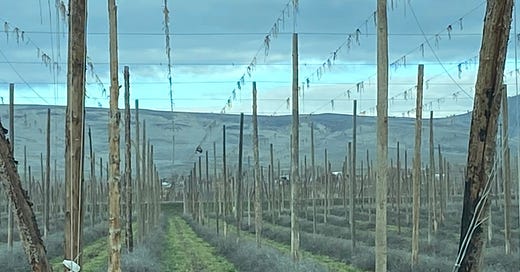How brewers can save money on hops
In my last article, “The Game is Afoot”, I mentioned I would announce something on the Modern Brewer Podcast. I hope you all listened and subscribed to that podcast. If you didn’t have time, or didn’t want to listen to me talk about hops for 90 minutes, keep reading to learn about the announcement I made.
It’s no secret that brewers producing less than 1,000 barrels (1,173.48 hectoliters) pay higher prices than larger commercial breweries. They don’t get the same red carpet treatment. Two reasons for this are:
Relationships in the hop industry are transactional (i.e., the more money you spend the more attention you get), and
A low purchase volume means it takes more time and effort per pound/kilo to sell to a small brewery than a larger one.
THE ANNOUNCEMENT
I’ve come up with a way to offer small brewers hops at big brewer prices. The idea is to gather a group of brewers together and use cooperative bargaining and a few other tactics to secure lower prices. OK … that’s not rocket science, I know. What is unique is that there will be complete transparency on the costs associated with the hops in the box. Brewers will know where every penny went. Also unique … I won’t take any profit from the sale of the hops. I’d rather brewers become paid subscribers to the MacKinnon Report. Grouping brewers together to save money is a way to create value for MacKinnon Report subscribers. Depending on the prices they’ve paid in the past, a small brewery should save between two and five dollars per pound ($4.40-11.00/kilogram). As I mentioned on the podcast, if you’re a brewer and you don’t think you can afford to subscribe, message me on LinkedIn or Instagram. We’ll figure something out. I don’t want a subscription fee to be the reason a brewer can’t save money.
I believe brewers should be well-informed about hops. Based on the comments I’ve heard about The MacKinnon Report, it seems the people who control the hop industry aren’t too happy that I share how the market works. In the paid version, I plan to reveal even more.
This is a good time to remind readers that the first paid version of the MacKinnon Report will be start in less than two weeks. I’ll analyze a wider array of topics with the potential to affect the cost of beer and provide analysis explaining how it will affect farmers and brewers. There will still be a free version, which will be a summary of the paid version without the analysis. You have to opt in to the paid version. If you’re already subscribed to the free version, that’s what you’ll keep receive going forward.
I hope your enjoying this article so far. I think the best part is below. If you’ve found some value in what you’re reading, please take a moment to subscribe or share the article with a friend. That would be a great way to pay forward the value you received.
LEX
I’ve been asked by multiple brewers, “How this idea is different from Lupulin Exchange?” Fair question! There’s nothing wrong with Lupulin Exchange, but it comes with a built-in market lag. Other confidential services trying to liquidate contracted hops suffer from the same problem. Brewers aren’t merchants. Their prices don’t reflect the current market. Instead, they try to recoup their costs. Another issue … everybody and their dog is watching who is selling on the Lupulin Exchange. What I’m suggesting would be confidential and take advantage of the current market to save brewers money versus buying hops contracted when prices were high.
KNOWLEDGE IS POWER
After more than a decade of expansion, the hop industry will contract for a few more years. Brewers working through massive, contracted inventories has created deflation. Under such circumstances, it’s unrealistic to expect the level of service small brewers receive to remain unchanged as some have suggested[1].
“We need to learn how to want what we have NOT to have what we want in order to get steady and stable Happiness.”
What you CAN expect is that merchant/farmers to do everything in their power to scare brewers so they ignore deflationary price trends. Merchant/farmers want brewers to contract hops today rather than waiting for prices to continue to decline. I believe that’s why Yakima Chief Hops™ revealed with their Action Plan[2]. In my opinion, it’s a brilliant scheme designed to drive contracting when contracting makes little sense. Deflation is good for creditors (i.e., brewers) because prices are decreasing. It’s not good for debtors (i.e., hop merchant/farmers) because demand is decreasing while their costs don’t[3]. Deflation leads to downsizing … already underway in the hop industry.
Over the next seven months, brewers should expect articles explaining how the supply of hops from the 2024 crop will be threatened. It’s already begun (Figure 1).
Figure 1. Instagram post from a well-known Moxee-based hop farm designed to infer trouble may be ahead for the 2024 hop crop.
Source: Instagram[4]
Before September, brewers will hear about too much rain, too much heat, too many pests, problems with the labor supply, low prices, not enough contracts, problems with the cost of labor, pesticide regulation problems and whatever other things can be spun as a crop threatening event. Some of these reports will be real. Others will be propaganda designed to encourage sales. If you’re a brewer … will you know the difference?
FUN FACT: According to the Northwest Avalanche Center, the White Pass Ski area, the mountains outside of Yakima received 37 inches (94 centimeters) of snow between February 24 and March 2, 2024[5]. The White Pass ski area is located less than an hour outside of Yakima and in 2021 was purchased by a group of Yakima-based investors that includes Patrick Smith of Loftus Farms[6][7].
IT’S COMPLICATED
A merchant who passed away a few years ago once told me, “It’s easier to make money in a bad hop market than when prices are high.” He was right. I’m not defending merchants or farmers. It’s better that service will be compromised instead of quality. If the market doesn’t stabilize within the next few years, quality will be next.
The coming years will contain mixed signals and market confusion. Each variety has its own supply and demand. Breweries have unique purchase strategies and inventory comfort level. Anybody who suggests a single strategy will work has an ulterior motive. Further complicating the situation are the substitutes available for every variety. The Hop Alliance substitution list demonstrates how complicated things are.
Another complication … Which companies will survive? If you’re curious, read my November 2023 article, “A Silent Hop Crisis is Brewing”, and my April 2023 article, “The Secret Behind Who Controls the Hop Industry” to understand which companies and families have the best chances.
Unless the brewer obsession with proprietary varieties changes, what I wrote in those articles remains true. Brewers paying high prices for proprietary varieties are encouraging a centrally-planned hop market. Central planning didn’t work in the Soviet Union and it will lead to the end of independent hop farmers and merchants. The acreage adjustments underway now demonstrate the power of proprietary varieties. The weaker the relationship between a merchant or farmer and the ownership of the patented varieties they grow or sell (i.e., the more independent they are), the more difficulty they will have.
For all the proclaimed love for hops, merchants and farmers exist to profit from brewers. They can’t win if they’re not in the game. For that reason, there’s a battle for market share and relevance underway. This can work to a brewers’ advantage.
THE CHOICE IS YOURS
The cooperative buying idea I’m offering will work if it a grassroots effort with widespread support. I am happy to offer my knowledge of the industry and contacts to help small brewers save money. I hope I’ve made it clear that I am offering this to make a difference, not to make a fortune. If you’re a brewer and you like the idea of saving money on hops, share this article with all your brewer friends.
Share it with your craft brewer guilds.
Share it with anybody else you think might be interested in spreading the word.
The more brewers involved the better the project will work. I’ve arranged to work with an existing supply chain to ensure brewers receive the varieties they want in the quantities they need at prices they will like while keeping brewery identity confidential. Big Hops won’t like this. They’re not fans of this Substack either. That’s ok with me.
“It’s never wrong to do the right thing.”
The craft revolution arose as an alternative to big beer. The Brewers Association supports the idea of Independent Craft Beer[8]. Due to an information vacuum, independent craft brewers empowered the biggest hop cartel in history[9]. If you’re a small brewer and want to support independent farmers, it’s time to introduce ethical sourcing to the hop industry[10].
INTERESTED
The sooner the group of interested brewers reaches critical mass the sooner I will offer the service. If you’re a brewer working at a brewery brewing less than 1,000 barrels (1,173.48 hectoliters) per year, this is an opportunity to create the future you want. If your brewery produces more than 1,000 barrels (1,173.48 hectoliters), you’re welcome to participate too. The more the merrier. Share this article with everybody you know and urge them to subscribe. If enough brewers aren’t interested by August, 2024 (There should be a deadline), I won’t bother.
Brewers,
If you have questions, get in touch with me. Let me know what they are. This is a program I will create to use what I know to combat Big Hop and save you money. You can vote with your dollars. It should cost you nothing in the end. If there isn’t significant demand, it will signal to merchant/farmers around the globe reading this that you’re content paying high prices and OK with the status quo. I hope to hear from you soon.
Doug
[2] https://www.yakimachief.com/commercial/hop-wire/action-plan
[3] https://fee.org/articles/the-history-of-deflation/
[4] The identity of the farm has been withheld intentionally to protect them from any negative backlash.
[5] https://nwac.us/weatherdata/whitepass/now/
[6] https://skiwhitepass.com/news/yakima-group-purchases-white-pass-ski-area
https://www.loftusranches.com
[8] https://www.brewersassociation.org/independent-craft-brewer-seal/
[9] https://www.dictionary.com/browse/cartel
[10] https://www.forbes.com/sites/forbesbusinesscouncil/2023/04/04/the-economic-benefits-and-best-practices-of-ethical-sourcing/?sh=c038913d7ca6







